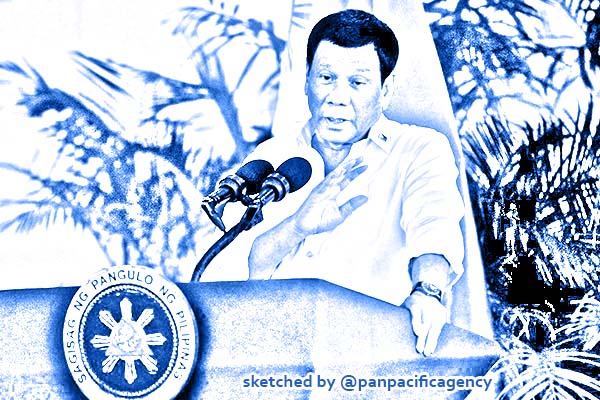Philippine president Duterte eased quarantine restrictions cause Covid situation is ‘not too bad’

Philippine President Rodrigo Duterte. Photo: Reuters. Sketched by the Pan Pacific Agency.
MANILA, May 30, 2020, The Manila Times. President Rodrigo Duterte on Thursday further eased quarantine restrictions in Metro Manila and other areas where the number of coronavirus disease 2019 (Covid-19) cases continue to be high, The Manila Times reported.
Acting on the recommendation of the Inter-Agency Task Force for the Management of Emerging Infectious Diseases (IATF-EID), the President downgraded the modified enhanced community quarantine (MECQ) in Metro Manila, Cagayan Valley, Central Luzon and Calabarzon, Pangasinan, Albay and Davao City to general community quarantine (GCQ) starting June 1.
During his televised briefing on Thursday night, Duterte also assessed the Covid situation in the Philippines as “not too bad,” citing the low death toll.
On that day, the Department of Health reported 539 new Covid cases — the highest single-day increase since March 31’s 538.
There were 15,588 confirmed cases nationwide, 3,598 recoveries and 921 deaths.
“Ang patay po is 921 (The deaths reached 921), so you would see that Philippines has a ratio and proportion vis-à-vis with the population, we have a low rate of mortality here in this country,” the President said.
He added that the country had 11,069 active cases, 330 in the National Capital Region alone.
“All in all, para sa akin, hindi naman masama ito (All in all, for me, this is not too bad),” he said.
At the same briefing, Health Secretary Francisco Duque 3rd explained that the spike in Covid cases was because of the rise in the number of cases that had been validated by the Health department.
He said testing laboratories were able to submit results faster because their systems have been automated.
“Our cases may have increased but overall, 90 percent are mild cases, 7 percent are asymptomatic or those who do not have symptoms, and less than two percent are severe to critical cases,” he added.
Metro Manila, Laguna, Bataan, Bulacan, Nueva Ecija, Pampanga and Zambales are under MECQ until May 31.
ECQ was earlier imposed in Cebu and Mandaue cities from May 16 to 31 since they are considered high-risk areas. The rest of the country was placed under GCQ.
The President also reiterated the country is not under martial law despite the large presence of police and soldier who were enforcing lockdown rules.
“I repeat, there is no martial law in the Philippines. Far from it. We are exercising the power of the State to protect public health. That is all there is to it,” Duterte said.
‘Low crime rate’
Interior Secretary Eduardo Año reported that 184,000 individuals had violated the quarantine, 54 percent of whom were arrested, 37 percent were fined, and the remaining 9 percent given warnings.
He said the crime rate in the country dropped by 60 percent during the lockdown.
The President vowed to release an official report about the procurement of medical equipment and supplies for the government’s coronavirus response.
He assured the nation that he would “not f**k” with public funds as he brushed aside the claims of Senators Franklin Drilon and Panfilo Lacson about irregular equipment purchases.
Duterte also defended Duque from criticisms linking him to the alleged anomalous transactions, stressing that he himself ordered the supply purchase since he knew the Health department was already “overworked” at the time.
Public health expert Dr. Susan Mercado welcomed the transition to a GCQ after a two-month lockdown.
“I think it’s time for us to start GCQ. I think we’re ready,” she told The Manila Times in a phone interview.
Mercado said the surge in Covid-19 cases was the result of ramped-up testing and aggressive validation.
“The number of newly tested cases sometimes looks like it’s increasing because there is a backlog or there is a delay,” she explained. “When you are looking at the new cases per day, that could reflect people who got infected a week or two weeks ago because of the delay in getting tested and delay in reporting the results.”
Mercado stressed that, based on hospital admissions, there was no increase in the number of people who were in critical care and the number of deaths had been going down.
In areas under GCQ, almost all industries except leisure and amusement services will be allowed to reopen.
The Department of Transportation (DoTr) said the resumption of public transportation would be implemented in two phases.
In a statement on Friday, the DoTr explained that during Phase 1, which would run from
June 1 to 21, only trains, taxis, transport network vehicle services, shuttle services and point-to-point buses would be operational at reduced capacity.
During Phase 2, from June 22 to 30, buses, modernized jeepneys, and UV Express units would be added, but also at reduced passenger capacity.
Traditional jeepneys would be allowed only if there would not be enough buses and modern jeepneys to accommodate commuters, DoTr Assistant Secretary for Communications Goddes Libiran said in a Viber message.
Provincial buses will not be permitted to enter Metro Manila under GCQ.
With repoirts from JAN ARCILLA AND LISBET K. ESMAEL